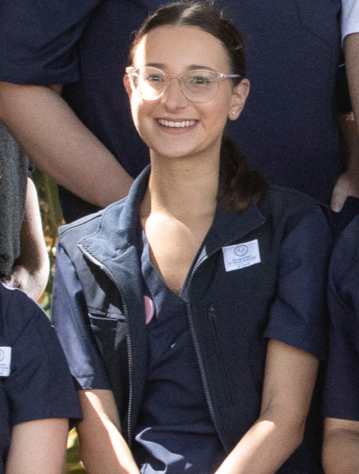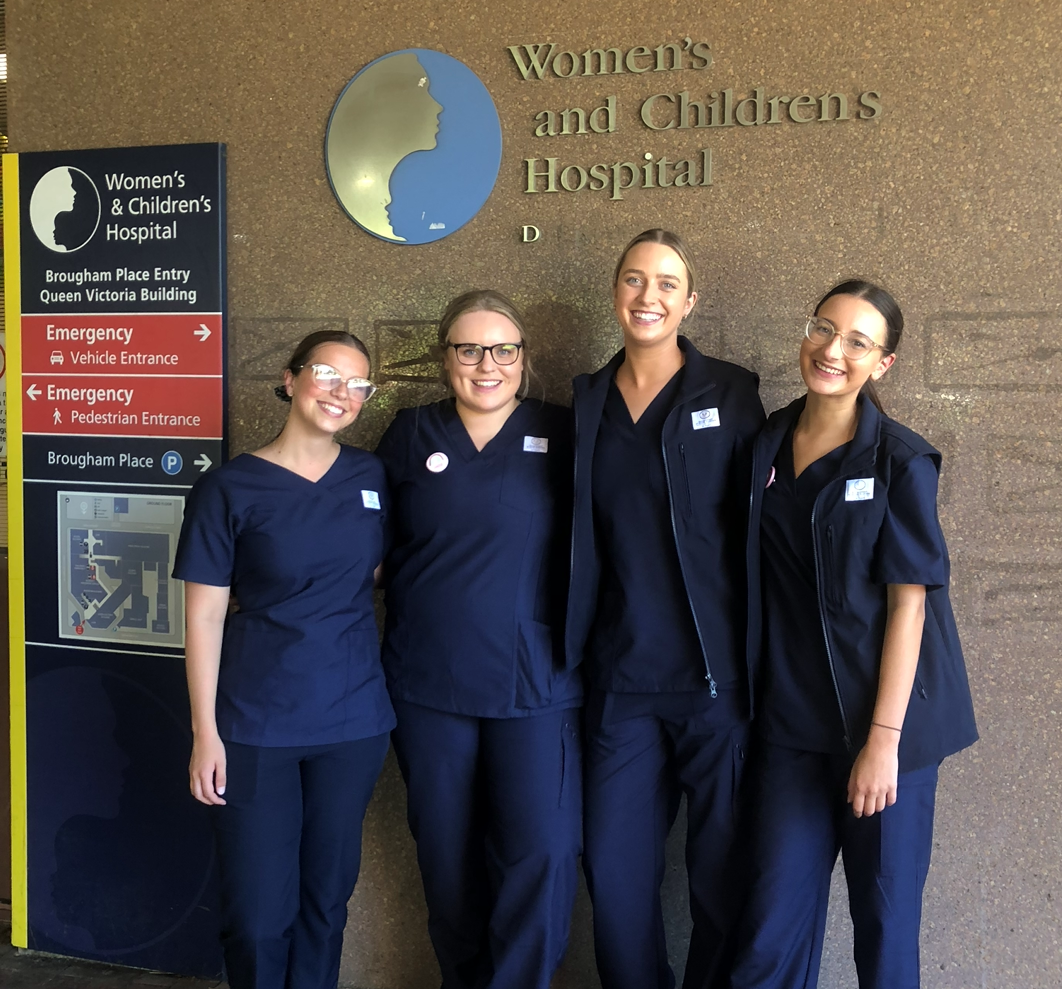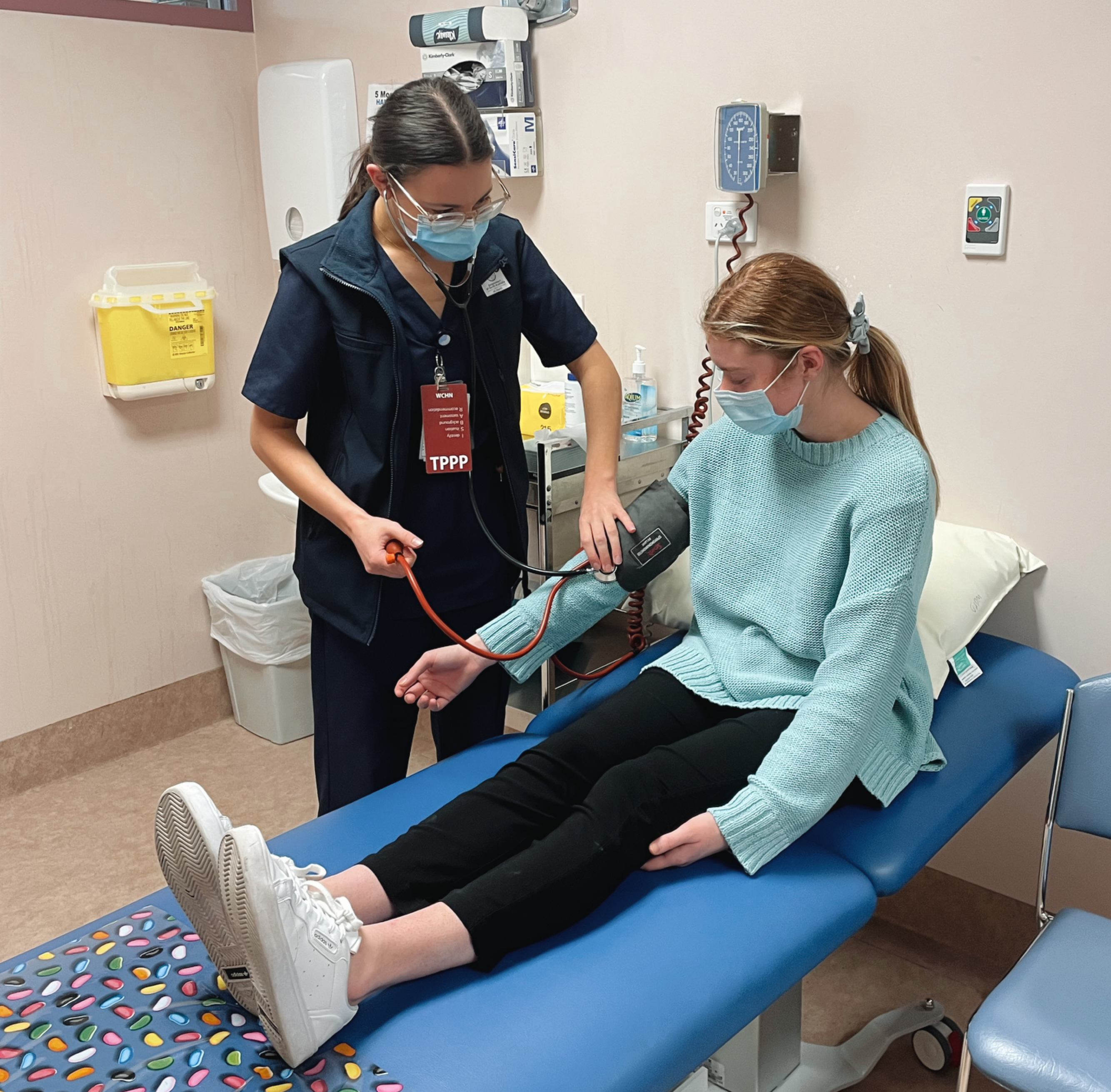15 October 2021
Article from October 2021 edition of INPractice
A young graduate’s dream job leaves her in tears of awe Midwifery graduate Sofia Polisena recalls crying in her car after attending her first birthing delivery.
 Above: Registered Midwife Sofia Polisena
Above: Registered Midwife Sofia Polisena
“And I just thought ‘how on earth am I ever going to be capable enough to do the midwife’s job’ because it was high stress and there’s a lot of things going on at once. I was quite excited and kind of blown away by the whole idea of it.’’
The former St Ignatius student, now 22, completed her Registered Midwife degree at the University of SA and began her midwifery career at the Women’s and Children’s Hospital in early February.
“No one in my family works in health except for my uncle, and my brother who recently became a psychologist,’’ Sofia says. “My uncle actually works at the Women’s and Children’s in the paediatric side in ultrasound. He’s a sonographer.
“I always knew I wanted to work in health care. I definitely wanted a career where I was doing meaningful work and making a positive difference in people’s lives.
“I was considering things like nursing, medicine and paramedics when I came across some old scholars from my school who were studying midwifery.
“They told me about the job and what it entailed and I honestly couldn’t think of anything more wonderful and special than nurturing and supporting women during such a special and personal journey in their lives.
“I thought it would be an absolute privilege to be a part of such a life-altering moment in someone’s life so I instantly knew that was something incredibly special and rewarding. I definitely couldn’t wait to start.’’
The three-year midwifery course entailed a high level of placement with students following expectant mothers from the beginning of their pregnancy, through the birth process and then during the postpartum period.
“We had about 15 women we had to care for, so we were on-call for their births, we were going to their appointments in between placements and lectures and workshops at uni, so it was quite a full-on degree, that’s for sure,’’ Sofia says.
“I’ve only been in delivery (at the WCH) 11 weeks, I believe overall I’ve had 12, 13 deliveries.
“It’s definitely busy, there’s always something to do on a shift, you are never, ever bored.
“It’s also a great environment to be in as a new and eager graduate because there is just always something to learn and obviously being one of the biggest obstetrics hospitals in SA you’re exposed to a variety of different patients with a number of complexities, which is particularly beneficial in your grad year when you’re a sponge and you’re trying to gain as much experience and knowledge as possible.
“It’s also great working in a metropolitan hospital. You work within a multidisciplinary team, you have a lot of autonomy as a midwife, you get to make decisions and be a valuable part of the team. It’s been great, I’ve loved it so far.’’
Sofia says her senior colleagues have been “super supportive” during her transition.
“I guess they’re very big on looking after yourself and prioritising things like self-care,’’ she says.
“It can be quite overwhelming, your first year out, you are learning every single day. They’re very supportive, they’re making sure we look after ourselves because if you don’t then you can’t look after other people.
“They’re big on getting as much practice and exposure as you can, they constantly remind us that ‘things will come with time and with experience’. We’re not expected to know everything and be completely independent, because obviously it takes time to become confident and each week that goes by things definitely do get easier, which is great.’’
Her current night shift runs from 9pm to 7.30am. “It’s definitely hard to adjust to, when you come off night shift you’ve just got no routine whatsoever, so it takes a couple of days to get back into it,’’ Sofia says.
“When we come in we get changed into our scrubs. And then we’ll go and have a debrief with our team.
The team leader will kind of go through if there’s any updates, anything about the ward we need to be aware of, particularly with COVID at the moment, there’s obviously new regulations and protocols coming out every day.
“So being aware of what’s new, and then we get a rundown of the wards, what patients are in which room, and then you’re allocated a particular patient. In delivery usually it’s one-to-one care.
“So, I’ll be allocated a woman. Usually as a grad you’ll get a labourer and then care for her throughout the night. You’re constantly updating your team leader about what’s going on,’’ Sofia says.
“If you need the medical team, they’re right outside and you can always grab them. Essentially giving mums one-to-one care throughout, supporting them during their labour and then potentially if they birth you get to obviously facilitate them with that and then you’re with them during their immediate postnatal period. So we’ll care for them for a couple of hours, make sure they’re safe and make sure the baby’s OK.
“And then we’ll bring them up into postnatal and that can all happen in one night shift,’’ Sofia says.
“Pregnancy is definitely an emotional roller-coaster. This begins during their antenatal period and continues during labour and birth and even the postnatal period. Obviously it’s a very overwhelming time for them, especially if they are first-time mums who are anxious and have so many questions and concerns.
“It’s definitely a big part of our role to provide them with as much education and reassurance and simply just being there for them during this huge transition.’’
The birth outcome is in the vast majority of cases a happy one, but the sad inevitability is not every birth will go to plan, something Sofia says her graduate studies helped prepare her for.
“When I was a student, obviously you’re out on placement and in the clinical environment straight away, so you kind of experience it as a student. You’re exposed to it straight away, so you are quite aware, especially as a graduate, what to expect when things don’t go to plan and you’ve got such a supportive team there as well,’’ she says.
“I think the profound amount of disappointment you feel when things don’t go to plan is the biggest challenge. Sometime babies will come out unwell. Sometimes mums might have to be transferred to a high-dependency ward. It can be hard because women might not get to spend that immediate postnatal period with their babies and get to hold their babies and it’s really hard for them to be apart from them.
“Same goes if they’re unwell straight after the birth then it’s hard for them to care for their baby because they’re the priority at the time.
“It’s definitely something that happens and it’s completely out of your control and it’s just about ensuring the health and welfare of the mum and baby and at the end of the day that’s the priority.
“And that’s part of our role to support women when things don’t go particularly right because it can be quite traumatic for them, particularly for future pregnancies, if they decide to get pregnant again.
“So it’s definitely about providing them with that emotional support as well.’’
The upside and what makes midwifery so rewarding and such a privilege, Sofia says, is “empowering women and their partners into parenthood”.
“Just being there watching them hold their baby for the first time, holding a happy, healthy baby, even just assisting them achieve that labour and birth outcome that they really wanted,’’ she says.
“Some women come in with very particular needs, a very particular plan, they really want that to happen and they don’t want things to kind of segue into different paths and if you can help them achieve that then they’re completely overwhelmed with happiness, which is so lovely to facilitate.
“I think helping women and their partners during difficult times, providing that emotional support and reassurance, trying to provide them with the most positive experience and outcome, it’s quite an amazing feeling.
I’m certainly loving it, it’s definitely overwhelming at times. Every shift is a little bit different, but I think it’s challenging in a good way.
“Every day I’m learning something new and I can’t quite think of anything more special than helping women and their partners during the most special moment in their life that I know they will remember forever. It’s been great to try and make a positive difference every single day.’’
Below: Sofia Polisena, right, and her colleagues at the WCH,
then Sofia attending to a patient.

 Click here to read the October 2021 edition of INPractice
Click here to read the October 2021 edition of INPractice